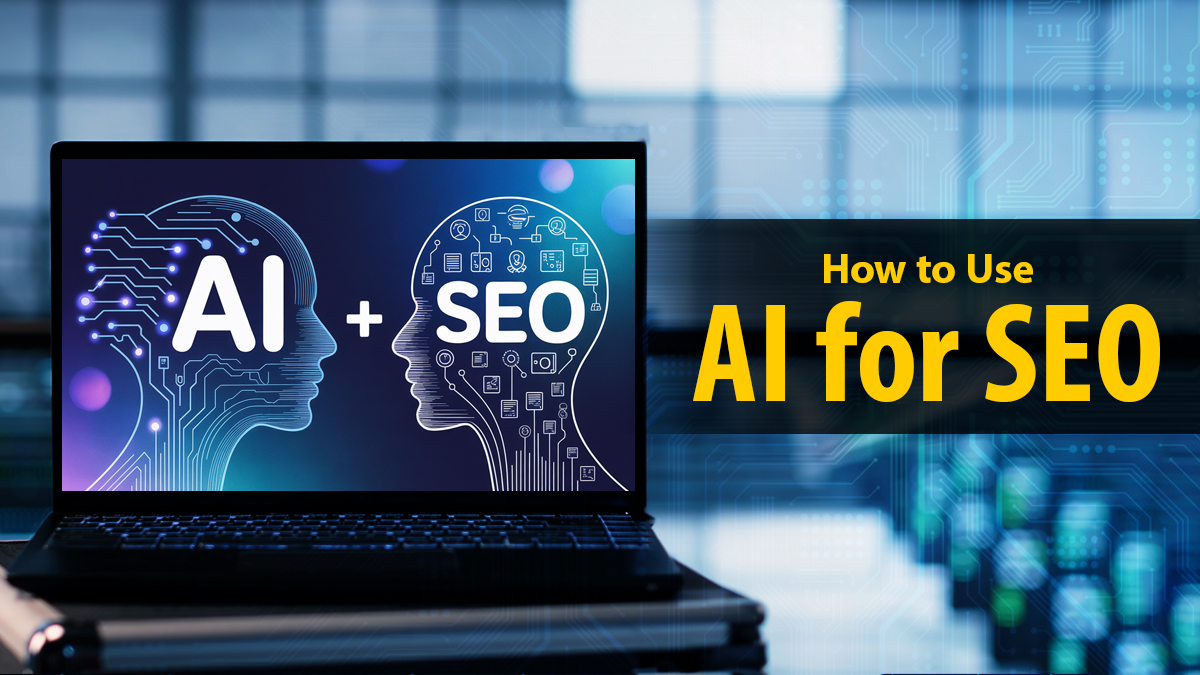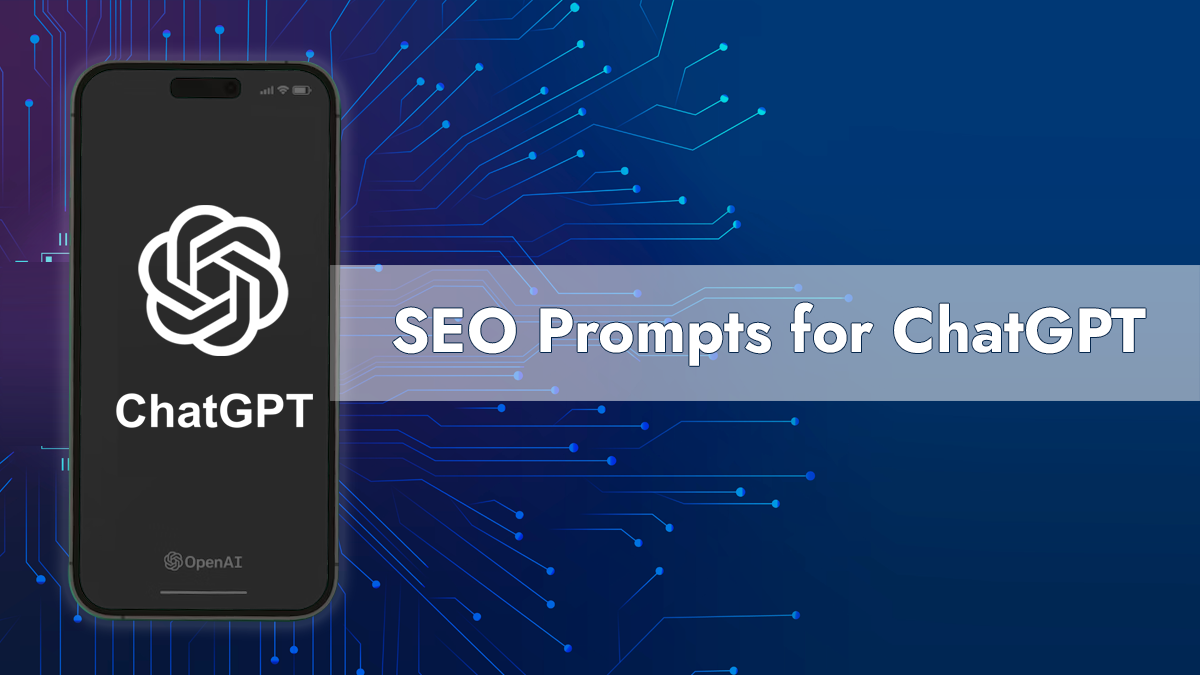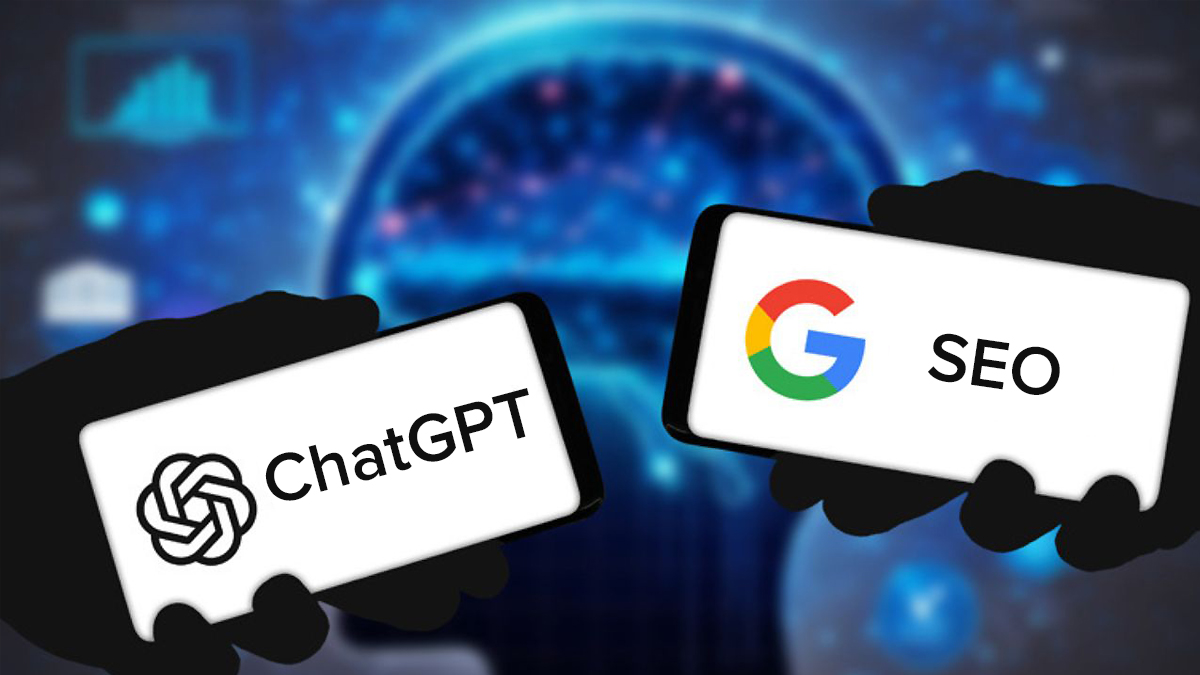The world of SEO is always changing, and as search engines become smarter, businesses must find new ways to stay ahead. AI has become a strong tool in SEO, helping marketers to automate tasks, improve content, and make better decisions based on data more easily than ever.
By using AI, SEO experts can look at a lot of data, find patterns, and predict results more accurately. AI is changing how we create and carry out SEO plans, from studying competitors and making content to building links and using schema markup.
AI can do tasks fast, accurately, and on a large scale, making it very important for businesses that want to be seen more online. No matter if you’re an SEO expert or a small business owner, this post will help you learn how to use AI for SEO, and improve your rankings.
What is AI for SEO?
AI for SEO is a big change in digital marketing. AI means that machines can mimic how humans think and learn. This includes things like learning new information, making decisions, and solving problems. AI SEO services leverage artificial intelligence to automate keyword research, optimize content, and enhance search engine rankings with data-driven precision.
SEO is about making online content better so it shows up higher in results pages. AI for SEO uses algorithms and data analysis to improve SEO methods in new and creative ways.
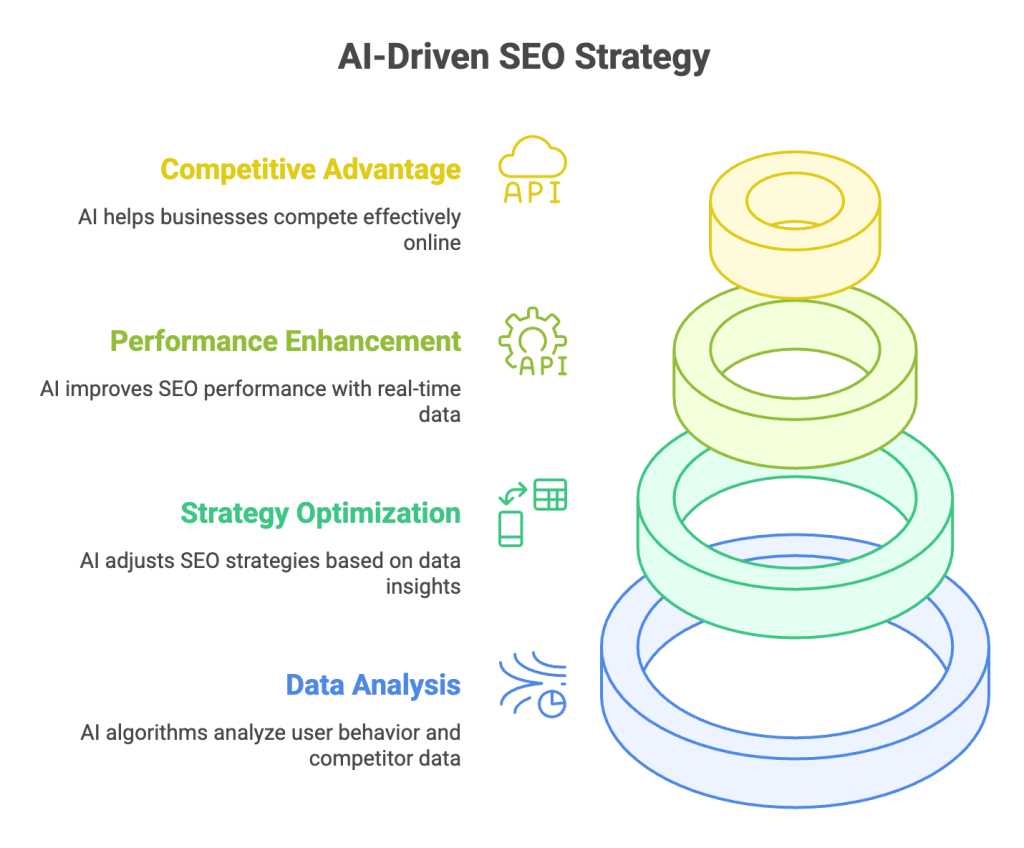
AI is changing how SEO works by helping marketers quickly and accurately look at a lot of data. Algorithms using machine learning can find patterns in data. This helps us understand how users behave, what people are searching for, and what our competitors are doing.
This method helps us use data to make smart choices and adjust our SEO strategies to fit changing search engine rules and what users want. Using AI for SEO offers many advantages.
AI tools can take care of slow tasks like finding keywords, improving content, and building links. This saves time so you can focus on planning and creative projects. AI for SEO helps businesses of any size grow, allowing them to use machine learning to compete well online.
AI algorithms can give us real-time data and performance scores, helping us see how well our SEO strategies are working and allowing us to make quick improvements based on the information.
How Can AI Make Keyword Research Better?
AI keyword research tools make it easier to find important keywords by using smart techniques like machine learning and NLP. These tools look at a lot of information to find important keywords that could bring more visitors to a website for free.
By using AI to automate finding information, you can focus your SEO efforts on the keywords that are most likely to succeed. AI can improve keyword targeting by using smart algorithms to understand what people want, look at search trends, and see what competitors are doing.
This helps find the best keywords for a business. These algorithms use methods like NLP, understanding meanings, and predicting results to grasp the context and meaning of search questions.
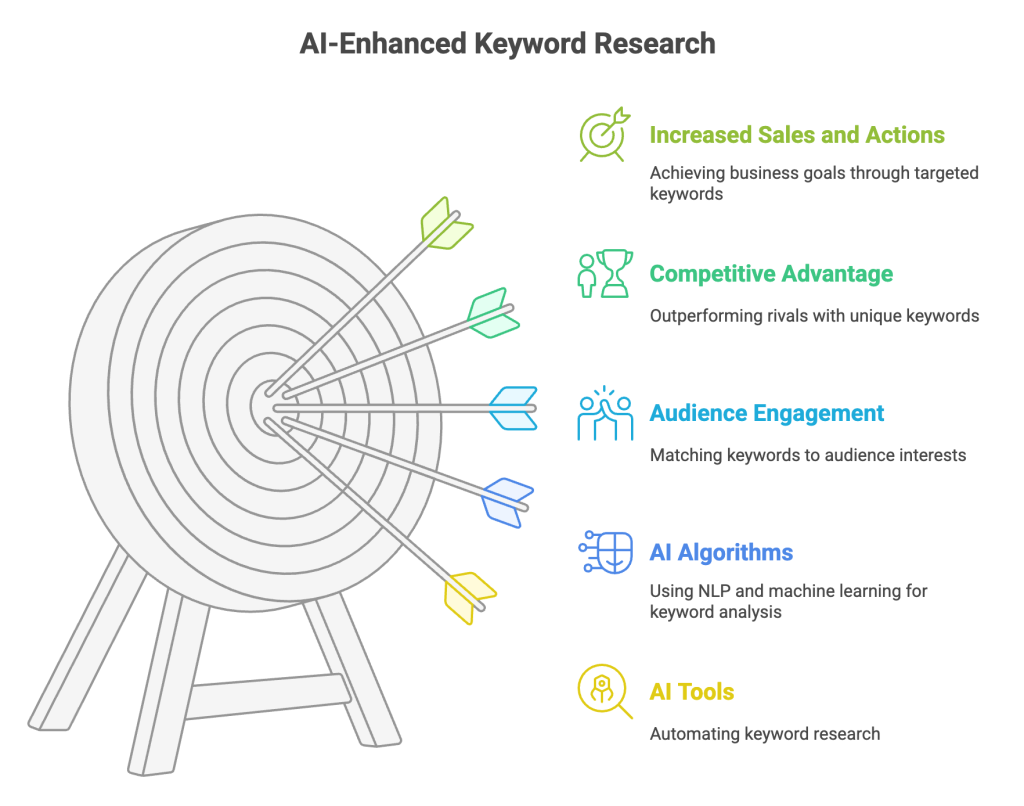
They help us find keywords that match what our audience likes and cares about. For instance, let’s say a meat company wants to improve how it chooses keywords.
AI programs can look at what people are searching for and how they behave online to find out popular topics and keywords, like “best red meat” or “how to cook meat with mashed potatoes?”
By knowing what people are looking for, the company can make specific content and ads that connect with their audience’s fitness goals and likes. AI programs are really good at finding specific keywords that are less common but can lead to more sales or actions.
Think about an automobile company that wants to grow its online reach. Instead of using broad terms like “diesel cars,” AI can help find specific items like “200 km electric car for urban use” or “affordable 50 kWh electric cars”.
Imagine a customer looking online for a car for travelling short distances. When they come across a website that uses these specific keywords, they’re more likely to find what they want, which means they are more likely to make a purchase.
Using AI to find keywords isn’t just about spotting the clear choices; it’s also about getting ahead of your rivals. A rival is at the top of search results for important words related to your business. It looks like they understand everything.
But when AI gets involved, it looks at their plans and finds the mistakes they missed. Now, you have a list of different keywords or phrases that can bring in the right visitors but face less competition.
How Can AI Help Create Content for SEO?
Content marketers handle many projects and have to meet different deadlines. They need to make interesting content that people enjoy reading and that helps bring more visitors to their website.
With AI tools, you can quickly come up with ideas, outlines, and complete drafts based on the keywords and interests of your audience. If you are a marketer trying to make website content that works well for search engines, you can use AI tools to help generate that content automatically.
These tools look at information from search engines, social media, and online discussions to find out what’s trending, what keywords are important, and what questions people are asking in your area of interest.
Thanks to generative AI, you can create high-quality, SEO-friendly content that connects with people and helps your website show up better in results pages. When you want to make a webpage better so more people can see it, AI can help.
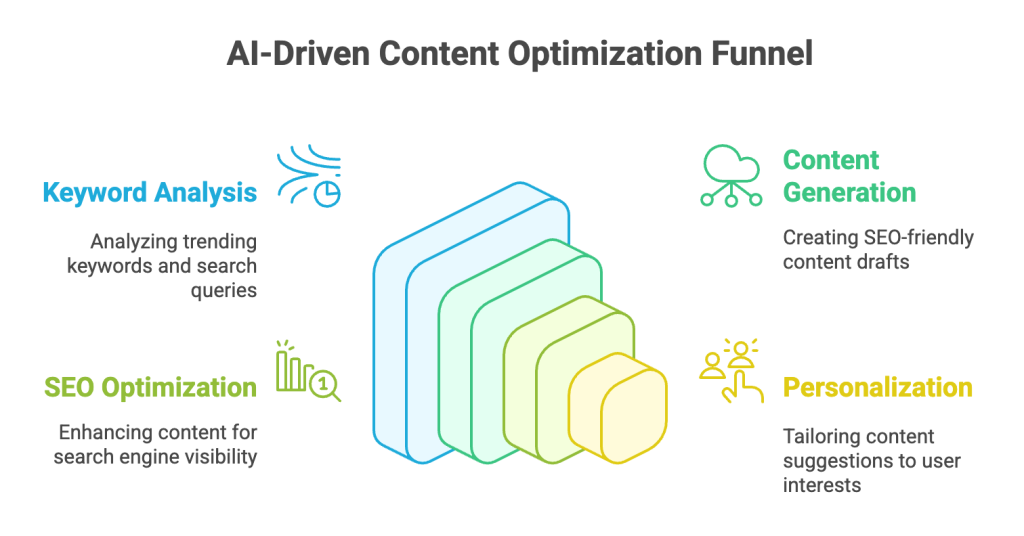
It helps by looking for ways to do better and suggesting changes to improve how well it shows up in results pages. It considers things like how often keywords are used, the metadata, how easy the text is to read, and how closely it relates to the topic.
This is done to make sure the content meets search engines’ rules and what users are looking for. AI programs can grasp the context and meaning of what people are searching for.
By using NLP techniques, we can make sure our content meets the needs, questions, and worries of our audience. AI programs can also do semantic analysis. This means that by using important keywords and phrases related to the topic, we can make our content better and more trustworthy.
AI-powered content recommendation systems change how we experience content by customizing suggestions based on what each user likes, their actions, and what they’ve done before.
Thanks to AI, when someone visits your website, they see a selection of articles, videos, or products that fit their interests and what they’ve looked at before. As they look around, they find an article that talks about a problem they have or gives a new solution they hadn’t thought of before.
Curious, they click to learn more. With every interaction, AI improves its suggestions, helping users take steps that lead to actions. Without AI’s personalized suggestions, this visitor might have left your site, and you would have missed out on an opportunity.
How Does AI Make On-Page Optimization Easier?
On-page optimization means making changes to individual web pages to help them rank higher in results pages and bring in more visitors. Let’s say you’re optimizing a blog post about safe driving methods.
You’ve already used your main keywords, but you’re thinking about other words you might add to improve your SEO results. With AI tools, you can get ideas for new and useful keywords that fit your content.
These tools help you find important words and show you how to use them in your writing. Next, think about how easy your content is to read. You want many people to enjoy your blog post, but you are not sure if it’s interesting enough.
AI programs help by looking at how your content is organized, the way you use language, and how users interact with it. This analysis shows that AI can help make your writing easier to read.
This way, more people will enjoy it and stay interested from beginning to end. As you improve your content, AI automatically generates tags and descriptions by looking at how users behave and what they are searching for at that moment.
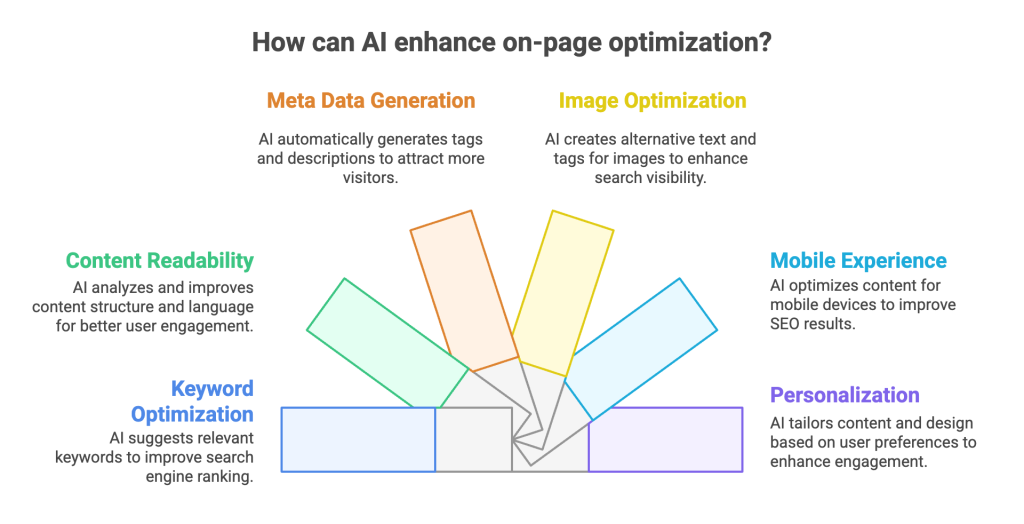
You might be creating a description for an ear pod. AI constantly changes the title tags, meta descriptions, and header tags to keep them interesting and up-to-date, which helps bring more visitors to your page. AI can also assist with pictures.
Imagine you are adding pictures on the page for a yoga mat you are selling. AI helps create alternative text and image tags with important keywords, making your content more attractive in image searches and boosting overall SEO performance.
AI helps you organize your content in a smart way that works well for both crawlers and people who read it. If you’re making a guide to local home food, AI can help you sort your information into clear sections and headings.
This will make it easier for users to find what they need and also help search engines understand your content better. AI improves the mobile experience, making sure your website appears in mobile results pages.
AI gives you suggestions to improve how things look and are arranged, helping you create a smooth experience on mobile that can boost your SEO results. We often discuss personalization.
AI-driven recommendation systems make personalized suggestions better than ever. Picture someone visiting your website to look for cooking equipment.
AI changes things based on what they like, their behavior, and their background to suggest content and designs just for them, helping them find products and information that match their interests and needs.
How Can AI Assist in Building Links?
Link building is an important strategy that involves getting other websites to link to yours. These backlinks tell crawlers that your website is trustworthy and important, which helps your site show up better in results pages.
AI tools can help you figure out which websites you might want to work with for building links. They use natural language processing to find trustworthy and helpful sources that can boost your site’s visibility in search engines.
They can also predict how much the websites you work with are worth, which helps you make a list of websites to contact that are most important. AI can help you see what your competitors are doing with their link building.
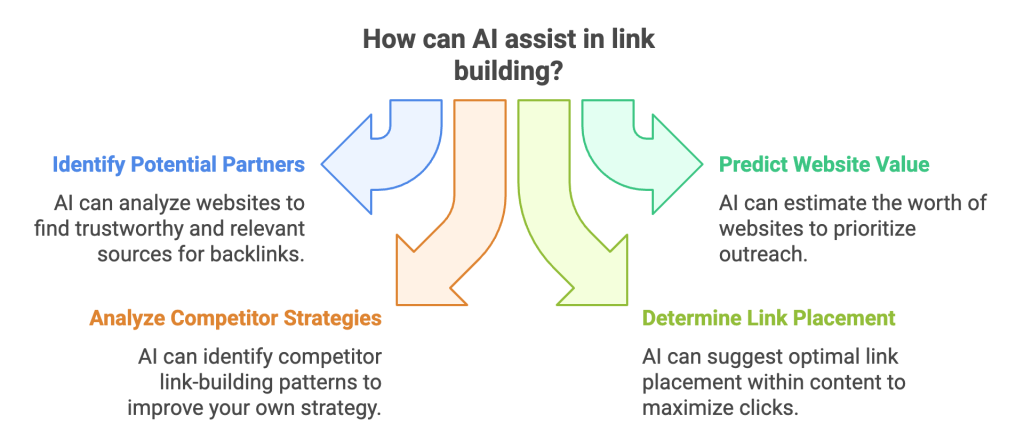
They can spot the patterns and methods that competitors use for building links, which helps your plan and improve your own link building strategy. AI tools can check how trustworthy websites are.
This helps you find the best websites to work with and decide where to put your backlinks in their content. For instance, if a trusted industry magazine mentions your website in an article, AI can spot this as a valuable link to your site.
It can also recommend words to use that fit well with the article and help bring visitors to your site. AI can look at how people use links and anchor text in content to find out the best ways to place them.
For example, if people often click on links in the first paragraph of an article, AI can suggest putting those links there more often to get more clicks and keep people interested.
Also Read: 100 Eye-Popping AI Statistics for Marketers in 2025
How Will AI Influence SEO in the Future?
As we look ahead, AI will greatly change and improve how SEO works. New trends in AI for SEO are likely to change the industry in the future. Here are some of our guesses:
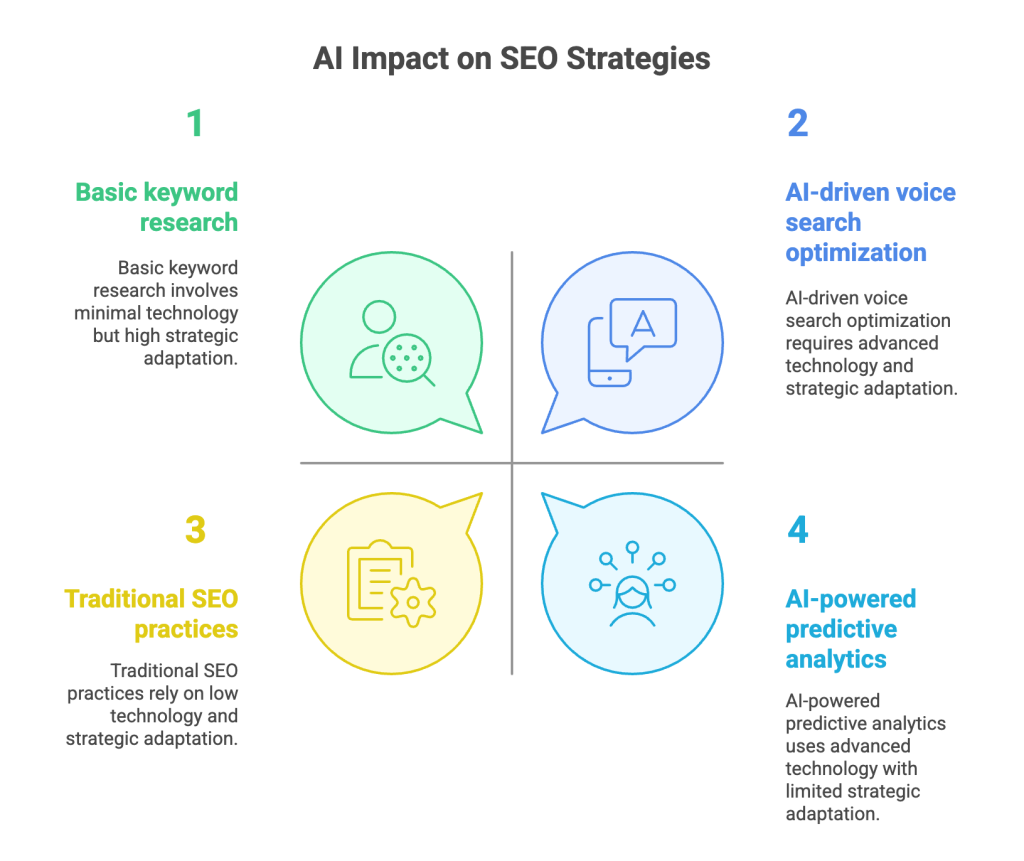
- As voice search technology becomes more popular and people start using conversational questions more, AI tools that use NLP will be very important for making content better for voice search. Marketers will need to change their SEO strategies to make sure their content is organized and improved for how voice search works.
- AI-powered tools will help us better predict changes in search engine rules, how users act, and trends in our industry. This will help marketers change their SEO plans quickly to stay ahead and take advantage of new chances. AI tools will help us provide better and more personalized content for users. This will lead to more interaction and more people taking action.
- As visual search technology gets better, AI will be very important for improving content for visual searches. AI image recognition technology will help us improve images by adding descriptive information and tags, making it easier for people to find them in visual searches. AI-powered image search engines will give users search results that are more accurate and relevant based on the pictures and their context.
- As AI technology affects how search engines rank websites, more people will want to know how these algorithms work and how to use AI in a fair way for SEO. To maintain trust with users and stakeholders, companies must clearly explain how they are using AI and make sure it follows ethical rules and privacy laws. Having strong security, like encryption, and identity checks can help protect against data leaks and keep sensitive information safe from unauthorized access.
How To Use AI For SEO – 10 Tactics
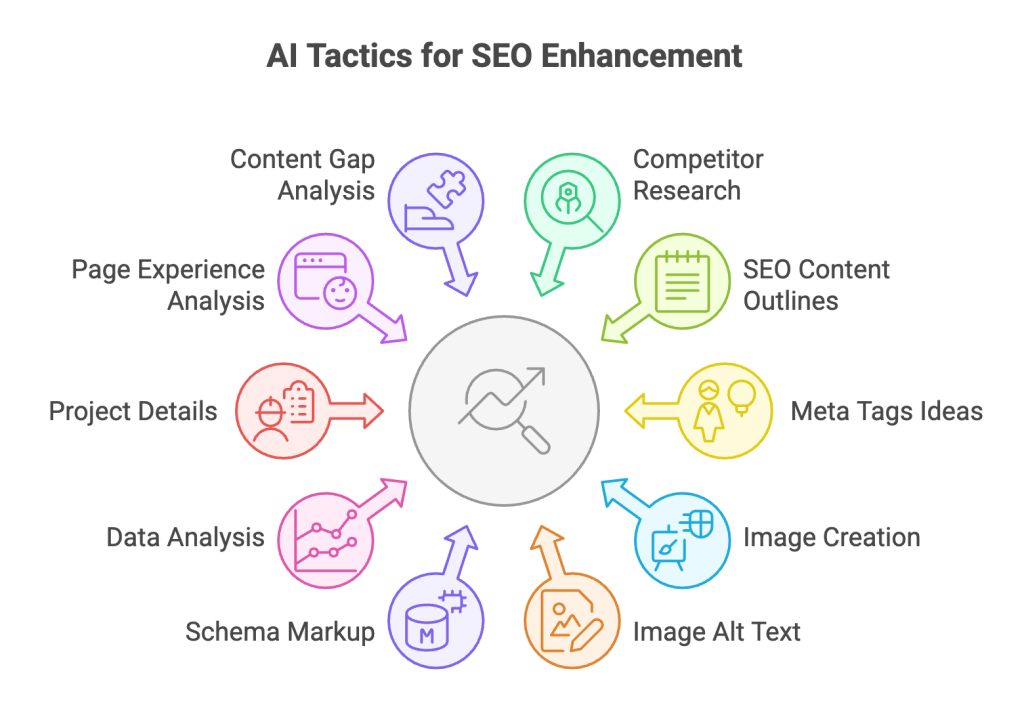
Competitor Research
Using AI for studying competitors in SEO can make it much easier to find areas where you can improve and new chances for your strategy. In the past, people had to collect data about their competitors’ websites, backlinks, and keywords manually.
Now, AI tools can do a lot of this work automatically, saving time and effort. AI tools can analyze your competitors’ websites and give you information about their best keywords, links from other websites, and their SEO methods.
They can quickly find patterns in your SEO work, helping you see ways to get better results. For example, AI can show you the important words that your competitors are using to rank higher than you, helping you to use those words in your own content.
It can help you find keywords that aren’t used much, see how their best content is organized, and discover topics that their audience likes. AI tools such as MarketMuse and Frase are very useful for this.
Also Read: The Big 4: AI Tools for SEO Content Briefs
SEO Content Outlines
AI can help you make outlines for content that are good for SEO, which means they can rank well in results pages. A main challenge in creating SEO content is making sure it is organized properly and works well for both crawlers and people.
AI can make this easier by creating clear content plans based on keyword research and what people are looking for. AI tools like Jasper and Copy.ai use natural language processing to look at the best pages online for a particular keyword.
They can create outline plans that show both the main subjects usually discussed and important smaller topics you might have missed. These AI tools can find groups of related words and ideas that help make content clearer and more trustworthy.
AI can recommend the best number of words, titles, and where to add action buttons to make your content better. This efficiency is really helpful for big content teams or agencies that have to create a lot of SEO-friendly content quickly while keeping it high quality.
Ideas for Meta Tags
Like meta titles and descriptions, these are important for SEO because they help crawlers understand what a page is about. These tags also affect how many people click on the links because they are the first thing users notice in the search results.
AI can help create better meta tags that make your content easier to find and more relevant for specific keywords. They can look at a webpage’s content and recommend catchy titles and descriptions that include important keywords.
The AI can include important keywords while keeping the tags short enough so they don’t get cut off in search results. Also, AI can give you different versions of meta tags to try out and see which one gets more people to engage.
AI is really useful for creating meta tags because it can look at what competitors are using for similar content. This ability improves your meta tag plan, making your pages more noticeable in search results and helping them get more clicks.
Image Creation
Pictures are important for making the user experience better, keeping people on the website longer, and helping with search engine rankings. Not all images help SEO in the same way.
AI can create good-quality images for your content that grab attention and help with SEO. AI tools like DALL·E, and MidJourney use machine learning algorithms to create pictures based on certain words or ideas you give them.
AI image creators can make special pictures, so you don’t have to rely too much on common stock images that can make your content seem ordinary. Also, AI can help make images smaller so they load faster.
Tools like TinyPNG and ImageOptim use AI to reduce the size of pictures without changing the quality. Using AI to make attractive and related pictures can make your content better, and help you rank higher in image searches on sites like Google Images.
Image Alt Text
Image alt text is important for SEO, especially for searching images. It helps search engines know what the picture is about and makes it easier for people who have visual impairments to understand it. AI can help create keyword-filled descriptions for images.
This makes the images easier to find on search engines and ensures that everyone can understand them. AI tools like Google Vision and ImageAI can look at images and create simple descriptions based on what they see in the images.
Using AI, you can automatically create alt text for many images at once. This saves time and reduces the number of mistakes. The AI detects important parts of the image, like objects, colors, and text, and writes descriptions that show these parts.
Besides making search engines better at finding your site, AI can help make your alt text easier for everyone to understand and follow rules that help all users. This can make your site more trustworthy and help you reach more people.
Generating Schema Markup
Schema markup is important for SEO because it helps search engine crawlers understand what is on your website. This can make your site more visible and improve its rankings on results pages.
AI can greatly simplify how schema markup is created, making it easier for website managers to use structured data. AI tools like Schema App, and Merkle’s Schema Markup Generator can quickly look at your web pages and create the right schema markup for you.
These tools usually find important parts on a webpage, like product details, reviews, events, and articles, and then make organized data using JSON-LD or Microdata code. Using AI to create schema markup helps search engines understand your content better.
This can lead to rich snippets and knowledge panels, which can attract more clicks and make your site more visible. Also, AI tools can help keep the schema markup the same across big websites. This means all pages can be good for search engines without needing to change each page manually.
Data Analysis
Using AI for data analysis is a big deal for SEO. It helps marketers get useful information from complex data and make better choices. Old SEO methods depended on people checking things like website visits, rankings, and links manually.
But AI can handle a lot of data quickly and find patterns that are hard to see without help. They use smart computer algorithms to look at a website’s visitor data, keyword positions, user activity, and other important SEO facts.
These AI tools can show what is working and what isn’t by looking at how users interact with a website, like how often they leave quickly, how long they stay on a page, and how many people take action.
For example, AI can guess how changing a website’s design or content might affect its ranking. This helps teams improve their strategies ahead of time. Also, AI can spot unusual changes in data, like sudden drops in website visitors or keywords falling in rankings, which helps in taking quick action to fix these issues.
Project Details
When working on SEO projects, it’s important to have clear and organized plans to ensure everything goes well and can be easily monitored. AI can help make the creation of project details easier and faster, making sure that teams stick to a clear and simple plan.
AI tools like Monday.com, Trello, and Asana can work together with SEO platforms to create project plans based on in-depth SEO reviews. AI can quickly gather important information from keyword research, competitor checks, and content reviews, and turn that into specific tasks for writers, web designers, and SEO experts.
These tools can help create schedules, decide what needs to be done first, and find important metrics to track during the project. AI can help make better project plans by looking at data from previous SEO projects.
It can find patterns that show which strategies are likely to work best in future campaigns. AI can help make the specification process easier and better, which can cut down on mistakes and make sure SEO projects are done on time with the best results.
Analysing Page Experience
Page experience is an important part of how websites are ranked in results pages. Search engines want to display content that gives a good experience. AI tools help you improve how people use your website, making sure it meets the standards for better rankings.
AI tools can check important parts of your webpage experience. They look at how fast the page loads, how well it responds when you click on things, how stable the visuals are, and how it works on mobile devices.
These tools use smart algorithms to study data and give helpful advice on how to make things better, like improving images, running JavaScript, and making servers work faster. Besides technical details, AI can check how users interact with a page and how that affects their experience.
AI can also follow user actions, like how long they stay on a page, how often they leave quickly, and how much they interact with the page. Using this information, you can change your website’s design and features to make it better for users.
Content Gap Analysis
This is a key SEO method that helps you find topics your website is lacking, which your competitors are talking about, and how you can use that content to attract more people. AI can greatly improve this process by looking at a lot of content on your site and comparing it with what your competitors have.
It helps find areas where your site is not doing well or where it needs more useful content. AI tools like MarketMuse, Frase, and Clearscope use natural language processing to look at the best pages for your chosen keywords.
They help you find important topics and keywords that are missing or not covered well in your content. These tools can create clear reports that show which keywords and topics your competitors are doing well with, but your website hasn’t focused on yet.
This can help you find new ideas and make focused and well-optimized content that answers specific questions and meets what people are looking for. This can help you improve your current content plan and give you an edge over competitors.
Final Thoughts
AI has changed how we do SEO by giving us strong tools to improve every part of it. AI helps SEO experts by doing repetitive tasks automatically, looking at a lot of data, and improving content for search engines.
This allows them to make better choices, improve their plans, and work more efficiently. AI offers easy solutions for things like studying competitors, improving keywords, making user experience better, and creating good backlinks.
These tasks used to take a lot of time and effort. As search engines get more complex and how people look for information changes, AI will maintain being very important in how we improve SEO practices.
Using AI tools and strategies is essential for businesses that want to be ahead in their niche in the online market. By using AI for SEO, businesses can find new chances, improve their rankings, and get more people to their websites.
FAQs
Can AI predict changes in SEO trends and search engine algorithms?
Yes, AI tools can forecast SEO trends and changes in search algorithms by looking at past data and spotting patterns. These tools use smart technology to notice changes in how users act, updates in search engine algorithms, and how well content is doing. By constantly looking at big sets of data, AI can predict future SEO trends, helping businesses change their plans early. This skill lets companies stay in front of their competitors and adapt to changes in how search engines rank websites.
How does AI improve mobile SEO?
AI improves mobile SEO by looking at things like how fast a page loads, how well you can use it on mobiles, and how easy it is for users to have a good experience on their phones. They can check how well a mobile site works, offer ideas to make it look and work better, and automatically change the content to fit mobile devices. AI can also keep an eye on important mobile ranking factors, like Core Web Vitals.
How can AI help with SEO audits?
AI tools can speed up SEO audits by quickly looking at your website’s setup, content, links, and individual page details. These tools check things like how easy it is to use a web page on the site and also on mobile devices, how often keywords are used, and any technical problems like broken links and copies of content. AI tools for SEO can find important mistakes and suggest ways to fix them, helping businesses make their website’s SEO better without having to check every single page by hand.
Can AI assist with SEO with multi-language strategies?
Yes, AI can improve SEO for different languages by automatically translating content and making sure it works well for various markets. AI translation tools can help find popular words and trends in different areas, making sure that the content is suitable for each language and culture. By looking at worldwide search data, AI can recommend local keywords and content ideas. This helps businesses improve their rankings in different countries and languages while keeping their regional SEO strategies consistent.
How does AI help make voice searches better for SEO?
AI studies voice search data and learns how people naturally speak and ask questions. AI tools understand the meaning of words, similar words, and longer phrases that people often use when they search with their voices. By making content better for questions and featured information, you can show up in voice search results. AI tools can help you find the most popular voice search phrases, so you can adjust your content to match what people are searching for.
